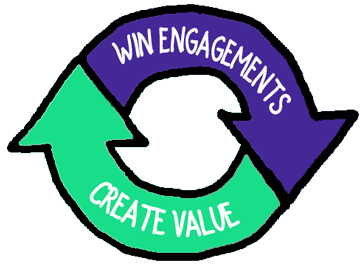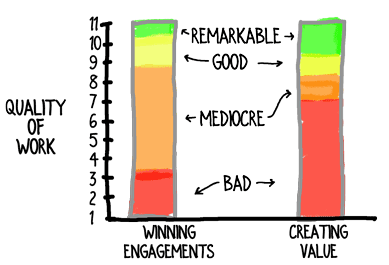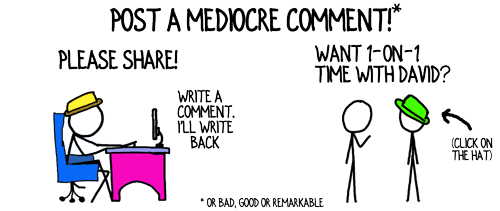Okay, before you twist your propeller into a pretzel over the title of this article and the mere suggestion of mediocre consulting work, let’s break the idea down.
(After that, I encourage you to twist and comment.)
Part 1 – What is Consulting Work?
The core of a consulting firm’s work is a spinning, two-part cycle: Win Engagements, and Create Value.

Part 2 – What is Mediocre?
You can grade your consulting firm’s work based on its impact on your firm’s reputation among clients and prospects. In other words, the recipients are the judge of quality. This applies to your work winning engagements (the six steps outlined here) and to your work creating value during engagements.
A few points on the continuum are:
| Quality of Work | Impact on Reputation |
|---|---|
| Bad | Deleterious |
| Mediocre | None |
| Good | Marginally Positive |
| Remarkable | Extremely Positive |
Part 3 – How is Quality Judged?
Quality benchmarks for Winning Engagements are different from those for Creating Value.
Surprisingly, it’s easier to create remarkable value for a client than it is to produce truly remarkable, visibility-building work.
On the other hand, while you can get away with uninspired marketing, an uninspired deliverable can torpedo your reputation with current clients (and future prospects).

Part 4 – Is Mediocre Okay? Yes, if…
It’s one effort among many in your work Winning Clients. In other words, Mediocre is okay for marketing; or…
It’s one step on your way to a Good or Remarkable final product for your clients. An iterative, C2B2A process can be highly effective.
Part 5 – Five Great Reasons to Do Mediocre Work
- It’s Easy, and Jolts You into Motion!
This may be the most important reason to endorse mediocre work. Many consultants struggle to start tasks that are difficult, distasteful or daunting. The fear of failure freezes them.
But what if you give yourself permission to do a downright mediocre (or even bad) job—at least at the outset? You’ll find your barriers to getting started drop dramatically.
- High Quality is More Apparent by Comparison
In a vacuum, your work can be tough to evaluate. However, you (or those around you) can certainly see what isn’t good. Producing mediocre work casts your errors, imperfections and omissions into stark relief. That’s how you learn what good and remarkable look like.

- You Can Improve on It
Mediocre is a step along the way to remarkable. Very little is spontaneously outstanding. The value you create and the marketing you produce will continue to improve with each iteration.
- It’s Practice
As long as you’re constantly improving, practice rewards you with confidence and efficiency. Your big deliverable or big speech might take six days to craft the first time; however, after twenty repetitions—even mediocre repetitions—your prep time to shine on stage or in front of your client could drop to six hours or 60 minutes.
- A Mediocre Final Product is OK (for Marketing, Not for Clients)
To a large extent, quantity and frequency trump quality when it comes to building your consulting firm’s visibility. (See this article.) Not every marketing piece you produce will be remarkable and, in fact, it’s often difficult to predict which article, speech, book, tweet, webinar, etc. will be a hit.
So, keep pounding out the content, accepting the mediocre on your way to the occasional burst of superlative.
Now, are you still alarmed at the idea of mediocre consulting work? When has (or hasn’t) mediocre work been effective for you?
Text and images are © 2024 David A. Fields, all rights reserved.

 David A. Fields Consulting Group
David A. Fields Consulting Group 

David, I like your post because I have used this philosophy when developing a new service. For instance, this year I have been developing a new service, as a Cloud Service Provider. We are now providing remote desktops and networks in the cloud. Starting off small, with several dozen clients, we are learning the ropes, mostly support desk issues. But we are improving with experience. And even with a couple of hiccups, no one has fired us. So, starting off may be at the mediocre level, but my goal is to constantly improve and get to the remarkable level like we have done in DCAA accounting. If I thought I could only enter this market at the remarkable level, I would not have tried. But now I have a toe-hold in an industry that is growing at a phenomenal rate.
Mark, that is an absolutely phenomenal case study of using a “mediocre” standard to advance your consulting business. Congratulations on offering the new service and on creating a path from viable entry to remarkable service line.
David, I met you years ago at a conference (that I’m certain you wouldn’t remember) and have been following since.
I am dying to try this at work with a new service offering I’m developing, and I’ve been promoting the fact that not every early project needs to be great – good can be good enough. But I am facing obstacles from others in the firm who don’t subscribe to ANY mediocrity being acceptable.
What have you seen work to overcome resistance to an approach that allows for acceptable mediocrity?
Fascinating question, Steve. Usually the best course of action is to:
Let me know whether you think that will work and how it goes for you.
In the Agile software world, we speak of focusing on the Minimum Viable Product. The MVP is the very least we can do that provides sufficient value to have made it worth doing at all. This way we don’t over commit to features and functionality that will turn out to not be needed or to be misunderstood. It let’s us quickly deliver real value in small manageavle increments. Projects that adopt this approach are at least twice as likely to succeed as those that try to get everything right the first time.
Wow, that’s a great validation of the approach. Thanks for also tossing in some statistics, Derek. I would have guessed that projects are 5x to 10x as likely to succeed when you take a “C to a B to an A” approach, but 2x is more than enough to make the approach worthwhile.
good work is 90% perspiration and 10% inspiration. to often we let perfection get in the way of production. how good was shakespeare’s first play?
Wait, is that Shakespeare query a trick question? (I have no idea whether his first play was good… but let’s assume it was mediocre!)
You’re absolutely right. Good is the enemy of great, and perfect is the enemy of progress. Thanks for highlighting that point, Joe.